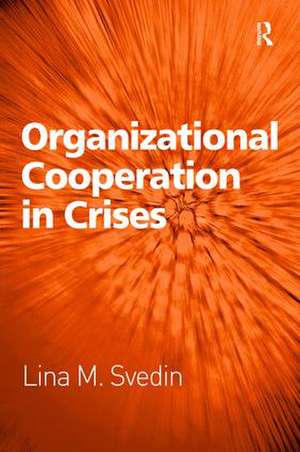Organizational Cooperation in Crises
Autor Lina M. Svedinen Limba Engleză Hardback – 19 iun 2009
Preț: 1110.11 lei
Preț vechi: 1353.80 lei
-18% Nou
Puncte Express: 1665
Preț estimativ în valută:
212.47€ • 220.98$ • 178.05£
212.47€ • 220.98$ • 178.05£
Carte tipărită la comandă
Livrare economică 14-28 martie
Preluare comenzi: 021 569.72.76
Specificații
ISBN-13: 9780754677253
ISBN-10: 0754677257
Pagini: 174
Dimensiuni: 156 x 234 x 11 mm
Greutate: 0.48 kg
Ediția:1
Editura: Taylor & Francis
Colecția Routledge
Locul publicării:Oxford, United Kingdom
ISBN-10: 0754677257
Pagini: 174
Dimensiuni: 156 x 234 x 11 mm
Greutate: 0.48 kg
Ediția:1
Editura: Taylor & Francis
Colecția Routledge
Locul publicării:Oxford, United Kingdom
Notă biografică
Lina M. Svedin is Assistant Professor, Political Science Department, University of Utah, USA
Recenzii
'Some crises are marked by a coordinated response, others by turf wars and blame games. Through an analysis of 100-plus crisis cases, Lina Svedin unearths the secrets of crisis cooperation. Applying a multidisciplinary perspective, Svedin takes crisis analysis to the next level. A real contribution to the growing field of crisis studies!' Arjen Boin, Louisiana State University, USA
Cuprins
Chapter 1 Introduction, Lina M. Svedin; Chapter 2 Conceptualizing Organizational Crisis Cooperation: The Legacy of Three Traditions, Lina M. Svedin; Chapter 3 Crisis Cooperation in Light of the Three Traditions: Case Illustrations, Lina M. Svedin; Chapter 4 Organizational Behavior in Decision-Situations, Lina M. Svedin; Chapter 5 Cooperative Strategies across Crises, Lina M. Svedin; Chapter 6 Linking Behavior and Strategies, Lina M. Svedin; Chapter 7 Cooperating in a Crisis Context, Lina M. Svedin; Chapter 8 Organizing for Crisis Cooperation: Conclusions and Implications, Lina M. Svedin; Chapter 9 An Agenda for Continued Research, Lina M. Svedin;
Descriere
Lina Svedin takes an interdisciplinary approach to present a systematic examination of organizational cooperation in crises. Bringing together three distinct research traditions on cooperation, the author draws on these traditions to examine how their variables fare empirically when applied to a wide set of cases and decision situations.














